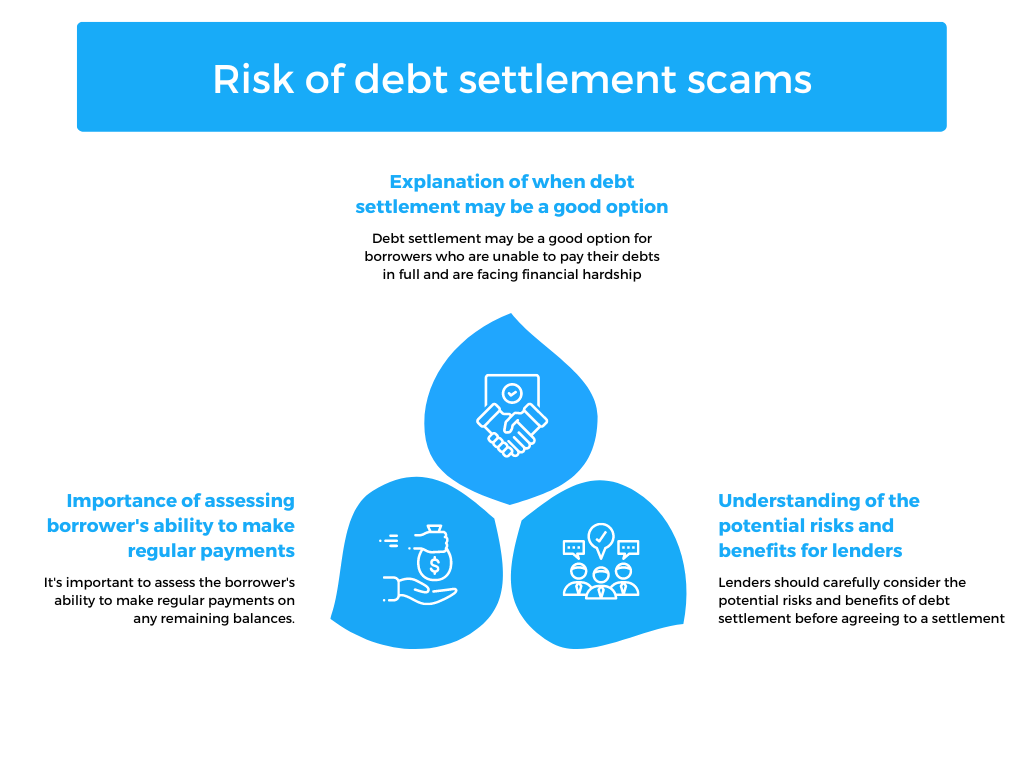Pros and Cons of Debt Settlement
I. Introduction
A. Explanation of debt settlement
Debt settlement is a process where a borrower negotiates with their creditors to settle their debts for less than the full amount owed. In a debt settlement, the borrower typically agrees to pay a lump sum or a series of payments that is less than the total amount owed to the creditor. The creditor agrees to accept the reduced amount as full payment, and the borrower’s debt is considered settled.
Debt settlement is often pursued by borrowers who are struggling to make payments on their debts, such as credit card debt, medical bills, or personal loans. Debt settlement companies may offer their services to these borrowers, helping them negotiate with their creditors and offering to settle their debts for a fee.
B. Importance of understanding the pros and cons of debt settlement
Understanding the pros and cons of debt settlement is crucial for making an informed decision about your financial future. Debt settlement can be an effective way to reduce debt and avoid bankruptcy, but it can also have negative consequences, including damage to your credit score and potential tax liabilities. By understanding these risks upfront, you can weigh the potential benefits against the potential risks and determine whether debt settlement is the best solution for your needs. It’s also important to understand your other debt relief options and protect yourself from scams. By taking the time to understand the pros and cons of debt settlement, you can make an informed decision and protect your financial future.
C. Brief explanation of other debt-relief options
Debt settlement can have several potential benefits for borrowers who are struggling with debt. Here are three pros of debt settlement:
A. Reduction in overall debt: Debt settlement allows borrowers to negotiate with their creditors to settle their debts for less than the total amount owed. This can result in a significant reduction in overall debt, making it easier for borrowers to pay off their remaining balances.
B. Possibility of negotiating lower interest rates: In addition to reducing the overall amount owed, debt settlement may also allow borrowers to negotiate lower interest rates on their remaining balances. This can save borrowers money on interest charges and make it easier for them to pay off their debts over time.
C. Avoiding bankruptcy: Debt settlement can be an attractive alternative to bankruptcy for borrowers who are struggling with debt. By settling their debts for less than the total amount owed, borrowers can avoid the long-term negative impact of bankruptcy on their credit score and financial future.
D. Potentially quicker resolution of debt
Debt settlement also has potential drawbacks and risks that borrowers and lenders should consider before pursuing this option. Here are three cons of debt settlement:
A. Negative impact on borrower’s credit score: Settling a debt for less than the total amount owed can have a negative impact on the borrower’s credit score. This can make it more difficult and expensive to obtain credit in the future.
B. Potential loss of revenue for lenders: Settling debts for less than the total amount owed can result in a loss of revenue for lenders. This can be especially problematic if the lender is relying on the expected revenue to fund their own operations or pay off their own debts.
C. Possibility of borrowers defaulting on future loans: Settling debts for less than the total amount owed may also increase the likelihood that borrowers will default on future loans. This is because debt settlement can have a negative impact on credit score, making it more difficult and expensive to obtain credit in the future.
D. Risk of debt settlement scams

Debt settlement may be a good option for borrowers and lenders in certain circumstances. Here are factors to consider:
A. Explanation of when debt settlement may be a good option: Debt settlement may be a good option for borrowers who are unable to pay their debts in full and are facing financial hardship. It may also be a good option for lenders who are unlikely to recover the full amount owed through legal action or collections.
B. Importance of assessing borrower’s ability to make regular payments: Before pursuing debt settlement, it’s important to assess the borrower’s ability to make regular payments on any remaining balances. This includes considering their income, expenses, and other debts. If the borrower is unable to make regular payments, debt settlement may not be a viable option.
C. Understanding of the potential risks and benefits for lenders: Lenders should carefully consider the potential risks and benefits of debt settlement before agreeing to a settlement. This includes assessing the borrower’s ability to make regular payments and weighing the potential loss of revenue against the costs and risks of pursuing legal action or collections.
D. Collaboration between borrowers and lenders to find mutually beneficial solutions
There are several alternatives to debt settlement that borrowers can consider before pursuing this option. Here are two alternatives:
A. Loan modifications: Loan modifications involve making changes to the terms of the loan to make it more affordable for the borrower. This can include lowering the interest rate, extending the repayment period, or changing the type of loan. Loan modifications can be a good option for borrowers who are facing temporary financial hardship and are unable to make their regular payments.
B. Refinancing options: Refinancing involves replacing an existing loan with a new loan that has more favorable terms. This can include a lower interest rate, longer repayment period, or a different type of loan. Refinancing can be a good option for borrowers who have good credit and are able to qualify for a new loan with better terms.
C. Payment plans
Lenders can work with borrowers to facilitate debt settlement by taking the following steps:
A. Educating borrowers about debt settlement options: Lenders can help borrowers understand the debt settlement process and the potential benefits and risks associated with this option. This can include providing information about debt settlement programs, working with reputable debt settlement companies, and answering any questions the borrower may have.
B. Offering debt settlement programs: Lenders may offer their own debt settlement programs to borrowers who are struggling to make payments. These programs may include a reduced balance, reduced interest rate, or extended repayment period. By offering debt settlement programs, lenders can help borrowers avoid default and minimize their losses.
C. Working with debt settlement companies: Lenders can also work with reputable debt settlement companies to facilitate settlements with borrowers. This can help streamline the process and ensure that settlements are reached in a fair and efficient manner. By working with debt settlement companies, lenders can also reduce the risk of legal action and collections.
D. Importance of assessing borrowers’ financial situations
In conclusion, debt settlement can be a viable option for both borrowers and lenders in certain circumstances. From the borrower’s perspective, debt settlement offers the potential for a reduction in overall debt, lower interest rates, and avoidance of bankruptcy. However, there are also potential downsides, including a negative impact on credit score and the possibility of defaulting on future loans.
From the lender’s perspective, debt settlement offers the potential for recovering some of the outstanding debt and avoiding legal action or collections. However, there is also the risk of loss of revenue and the potential for future defaults.
It’s important for both borrowers and lenders to make informed decisions about debt settlement and carefully consider all of their options before pursuing this option. This includes assessing the borrower’s ability to make regular payments, weighing the potential risks and benefits, and seeking professional advice from reputable financial advisors and debt settlement companies.
If you’re considering debt settlement, take the time to research your options, understand the potential risks and benefits, and seek advice from a professional before making a decision. With careful planning and informed decision-making, debt settlement can be a viable option for managing debt and achieving financial stability.
